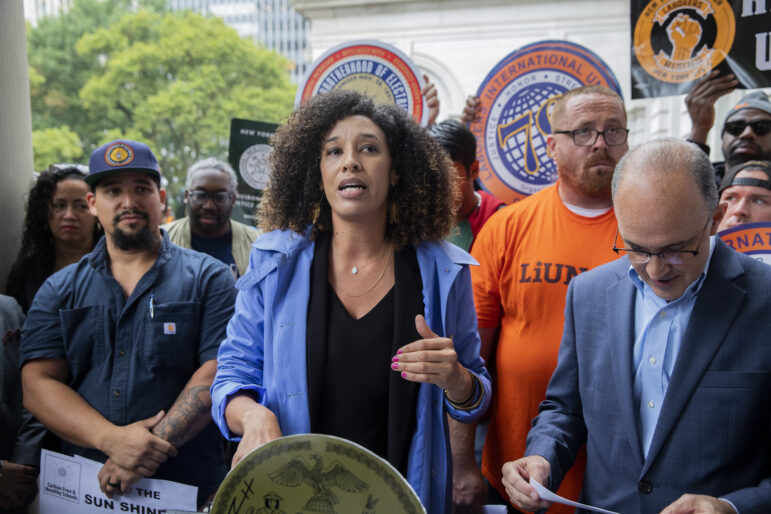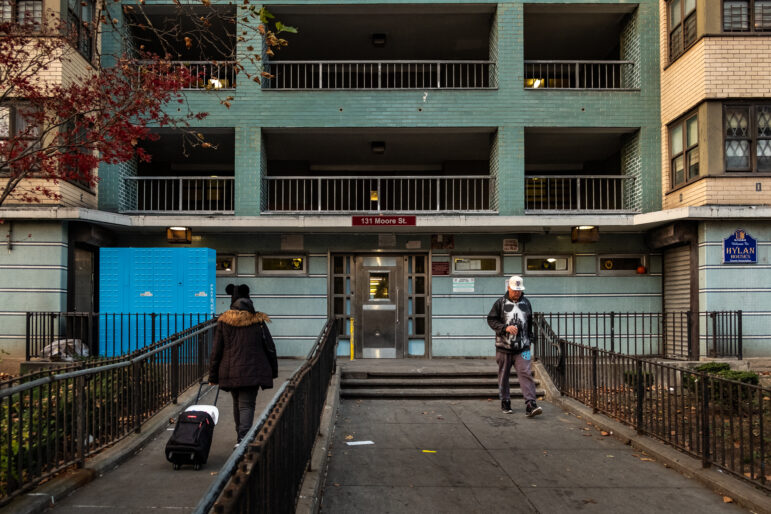When Steven Quester was arrested in 1992 during a pro-choice protest, he got off with an “Adjournment in Contemplation of Dismissal,” or ACD. As long as he wasn’t arrested again within a few months, the charges would be dismissed and his record sealed.
Quester stayed out of trouble, but that arrest came back to haunt him earlier this month, when he faced sentencing for another act of civil disobedience. He was one of 16 demonstrators arrested last March when they locked arms and lay in the middle of Fifth Avenue to protest the war in Iraq and the bulldozer killing of U.S. activist Rachel Corrie by the Israeli army. Most defendants received a sentence of community service. But four face unusually stiff penalties, including jail time and fines, which some activists see as a warning for those planning to demonstrate during the Republican National Convention.
“I’ve spent 20 years representing thousands of civil disobedience cases. I’ve never seen anything like this,” said civil rights defense lawyer Ron Kuby, an advisor to the Fifth Avenue demonstrators.
But more worrisome, says Stephen Edwards, who is representing the four, is that State Supreme Court Judge John Cataldo allowed prosecutors to open the defendants’ sealed court records, including Quester’s, and use them as evidence in criminal court. Edwards maintains that the use of the records was invalid. “An ACD is not a finding of any fault,” he said. “It is a finding to the contrary. In all of these cases the charges were dismissed with the consent and approval of the DA’s office.”
In a criminal court hearing, Prosecutors referred to the defendants as “serial demonstrators,” Quester says.
Edwards’ attempt to have his clients’ files resealed was unsuccessful; Quester and three other defendants will be sentenced next month. According to the Manhattan DA’s office, prosecutors have a right to unseal records. “There is a process the court uses for unsealing, and the court had a right to say that this is appropriate or this is not appropriate,” said spokesperson Barbara Thompson. “We filed papers requesting the unsealing, and that is our policy. The policy is to do what the law permits.”
“There are very limiting circumstances in which the government can seek to get records unsealed,” explains Christopher Dunn, an attorney with the New York Civil Liberties Union. But, he adds, “I don’t think they were present here.” Records may be unsealed, for instance, if a related case remains under investigation.
Manhattan isn’t the only place where records are being unceremoniously unsealed. Several attorneys have accused the Bronx DA’s Narcotics Eviction Unit of illegally sending tenants’ sealed records to their landlords.
Arrest records are usually sealed when defendants win their case or have it dismissed, they are convicted of a minor offense like disorderly conduct, or they are juveniles, says McGregor Smyth, civil action project director at Bronx Defenders. But in its zeal to evict drug dealers, he says, the DA’s office is sending out sealed records without permission. “Regardless of the specific facts, [these tenants] were never convicted of any crime and should not suffer the consequences,” he said. “Losing your home is an extreme consequence.”
Carla (not her real name) says she never would have knowingly allowed a gun in the apartment she shares with her four children. But when police searched the room of a young man living with her family, they found drugs and a weapon. He was arrested; Carla was released with no charges. She thought she could move on. Ten months later, she got an eviction notice.
That never should have happened, says her attorney, Jonathan Levy, who works in the Bronx office of Legal Services of New York. Because Carla’s roommate was a juvenile, his record should have been sealed. Instead, it was sent to Carla’s landlord, who then had grounds to evict her. That case is still pending. In response to a letter from Levy describing a similar case, District Attorney Robert Johnson acknowledged the error: “We have looked into the situation, and have tightened up this office’s procedures to insure that sealed records are not disclosed in such proceedings,” he wrote.
But Levy said he’s seen additional tenants’ records unsealed since then. “It’s really enraging,” he said, “when the people in government who are supposed to uphold the law violate it to make it more convenient to pursue some policy they want to pursue.”








